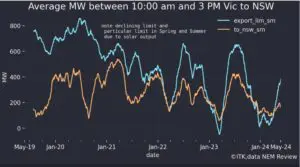Friday’s Council of Australian Governments (COAG) meeting is a line in the sand moment – when governments either agree to begin fundamental reform of the electricity market or perpetuate an inefficient, unproductive and uncompetitive 20th century energy system.
Australia’s electricity market is no longer working and needs substantial reform.
All Governments, except Western Australia and the Northern Territory, share responsibility for the National Electricity Market (NEM) and all Governments share responsibility for Australia’s climate change, renewables and energy policies.
The Australian Solar Council and Energy Storage Council call on all Governments to implement six key measures:
- Establish a plan for the orderly closure of coal-fired power stations;
- Make action on climate change a key objective of the National Electricity Market;
- Commit to at least 50 per cent renewables by 2030;
- Introduce a 5-minute settlement rule;
- Enable markets in peer to peer trading and demand response; and
- Replace the Australian Energy Regulator and Australian Energy Market Commission with a new combined energy rule maker and regulator.
The energy market is changing rapidly and will be completely transformed within the next decade by the combination of distributed and large-scale solar, energy storage, demand response, energy efficiency and smart energy management systems.
Done right, this transformation will put the consumer at the centre of the energy system.
This is what all Governments need to understand – the energy system as a whole, not just the electricity sector, will see greater change in the next 10 to 15 years than it has in the last 100, regardless of ideology.
A managed process will offer benefits to individuals while at the same time maximising the benefits for the entire economy.
Australia is manifestly unprepared for the energy transformation that is about to occur. That is why the Finkel Review, an independent analysis of the National Electricity Market which is reporting to COAG on Friday, is so important.
COAG Orderly closure of coal-fired power stations
A majority of Australia’s power assets are nearing the end of their useful economic operating life.
Decisions on what will replace them will lock us into assets with an operating life of 30-40 years and longer.
Australia needs a whole of economy transition plan that identifies well in advance when existing coal-fired power stations are scheduled to close and how they will be replaced.
This orderly and planned closure timetable gives time for workers and communities to adjust and new economic opportunities planned for affected communities.
The ANU’s Centre for Climate Economics and Policy, among others, has offered a market-based mechanism to achieve closures, which should be backed by Governments.
Making climate action a central objective of the National Electricity Market
Electricity remains the number one contributor to greenhouse gas emissions in Australia. The electricity sector must, therefore, lead the way in reducing Australia’s greenhouse gas emissions.
The National Electricity Market rules should be amended to ensure they are consistent with Australia’s international climate change commitments.
This can be achieved through an amendment to the National Electricity Objective (NEO) to include climate change and environmental factors. This proposal has been previously submitted to Energy Ministers by the ACT and other Governments, and it is more than overdue.
50 per cent renewables
Most Australian jurisdictions now have strong renewable energy targets for electricity supply:
- The ACT will deliver 100 per cent renewables by 2020;
- South Australia achieved 50 per cent renewables in 2017;
- Queensland’s target is 50 per cent renewables by 2030;
- The Northern Territory’s target is 50 per cent renewables by 2030;
- Victoria’s target is 40 per cent renewables by 2025.
The Australian Solar Council and Energy Storage Council call on all Australian Governments to support at least 50 per cent renewables by 2030.
A national commitment to generate at least 50 per cent of Australia’s electricity from renewable energy can be achieved through a range of measures, including:
- The current Renewable Energy Target, which closes to new entrants in 2020;
- The inclusion of pre-existing renewable energy projects;
- A carbon price of some form;
- Projects developed by the Australian Renewable Energy Agency (ARENA) and the Clean Energy Finance Corporation (CEFC);
- Action by State and Territory Governments, including reverse auctions for large-scale renewable energy projects;
- The rapid uptake of energy storage at residential, commercial and industrial scale;
- The implementation of energy efficiency measures; and the
- Introduction of emissions standards and the closure of ageing and redundant coal-fired power stations and emissions intensive facilities.
5-minute rule
We support an immediate rule change by energy market agencies to reduce the settlement period for the wholesale energy market from 30 minutes to 5 minutes. This would align the settlement and bidding processes and provide an appropriate incentive for energy storage and provide greater stability to the energy system.
We agree with the former CEO of the Clean Energy Finance Corporation, Oliver Yates, that “five-minute interval pricing, from our own analysis on battery projects, would change the revenue profile significantly and would then encourage batteries to come into the market and be available for short-term supply.”
Peer to peer trading and demand response
The National Electricity Market should be reformed to allow for increased participation of consumers in direct energy transactions using peer-to-peer or aggregated services providers.
Governments should review the rules of the National Electricity Market and the operations of regulators and utilities to ensure they do not prevent peer to peer trading.
Governments should work together to establish standardised processes for peer to peer trading.
The rules should also be amended to allow the development of markets for demand response – beyond the ancillary services proposal from the Australian Energy Market Operator (AEMO).
Changes in this area will drive more diverse participation and encourage faster transformation to a multi-path distributed energy network and bring lower costs.
We would also welcome the establishment of additional energy efficiency market tools, which are also well overdue.
A new energy market rule maker and regulator
Governance arrangements for the National Electricity Market are extraordinarily complex, with a number of non-elected, non-transparent bodies managing the rules of the NEM.
These governance arrangements need to be streamlined, with the roles of the Australian Energy Regulator and the Australian Energy Market Commission (as rule maker) combined.
Australia is the only jurisdiction in the world where these two energy market functions sit in separate bodies.
The new body should be led by someone who understands the extraordinary transformation that the electricity sector is going through globally and in Australia.
The Finkel Review has already achieved one important outcome – it has stimulated a much-needed debate on reforming the national electricity market.
Once the Finkel Review is tabled on Friday, we will have a blueprint for reform. We won’t agree with everything in the report, but we welcome the independence and the thoroughness of the process.
Governments should also consider establishing an independent advisory body – a permanent Finkel Review – to monitor the implementation of the recommendations of the Finkel Review and to provide ongoing advice to all governments on national energy market reform.
John Grimes is the Chief Executive of the Australian Solar Council, Energy Storage Council










